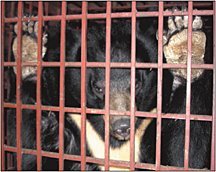With the Chinese government already under pressure to maintain its 14-year ban on tiger trade (September 2007 Acupuncture Today), it has come under even further scrutiny for yet another practice of farming endangered animals for traditional Chinese medicine products - specifically, Asiatic bears for their bile, gallbladders and other parts.
The majority of the bears in captivity specifically are farmed for their bile. Bear bile is used to treat a number of conditions, including:
- reduction of swelling, inflammation and pain, in cases of trauma;
- treatment of liver disorders;
- treatment of eye disorders; and
- reduction of fever.
The active ingredient in bear bile is called ursodeoxycholic acid (UDCA). Bears are the only mammal to produce UDCA in large quantities. Current annual consumption of bear bile in China is thought to be about 4,000 kilos. However, bile harvesting is about twice that, at around 7,000 kilos. Just as with tiger products, the surplus finds its way into such diverse ingredients as shampoos and wine. In some cases, the entire bear gallbladder is removed for sale, as well as its paws.
Bile extraction
Unfortunately, in order to extract the bile, bears are kept in quite deplorable conditions. They often are kept in cages the size of phone booths, according to the WSPA. A tube is inserted through the bear's stomach into the gallbladder, often performed by untrained workers, and the bile is allowed to freely drip into bowls placed below the cages. In some cases, the bears are placed into heavy iron corsets for ease of handling. In the course of visiting a number of both government- and private-owned bear farms, WSPA investigators reported seeing bears moaning in pain or performing what are known as "stereotypies" - shaking their heads or biting the cage bars. A full report of the WSPA's findings can be found here.
Furthermore, young bear cubs are abused even before they actually undergo the extraction procedure. Many farms force the cubs to perform for visitors, doing tricks such as walking on their hind legs or jumping through hoops. None of these are natural behaviors for bears.
Illegal trade
Sadly, trade in bear products is not just restricted to Asia. Another WSPA report examined international trade in several countries, including the United States. A survey of TCM shops across eight U.S. cities found:

- 15 percent of shops were selling bear bile, with 75 percent of these products reported as being from China.
- Awareness of the problems associated with illegal bear trade and bear farming seemed higher in western states compared with central and eastern states, where a higher percentage of shops were found to be selling bear products.
- Shop owners were on the whole very guarded when discussing bear trade. However, although many said they did not sell bear products, they did recommend where bear products could be found.
What are the alternatives?
In light of this, the obvious question is whether natural bear bile is essential to TCM formulations. On the one hand, Dr. Yang Liang of the Association of Traditional Chinese Medicine told the U.K. Times newspaper: "It's definitely painful for the bears, but the synthetic substitute is too different from natural bile. Traditional Chinese medicine attaches importance to every material as a whole and not just one ingredient. Laboratory-made bile is just bile acid, but real bear bile has many amino acids and trace elements."
In contrast, the WSPA argues that synthetic UDCA has been used for a number of years, both in Western medicine and TCM. Furthermore, the organization conducted a survey of 190 TCM practitioners in the U.K., the U.S., Australia and Canada to find what herbal substitutes they use for bear bile. From this, a list was compiled of herbs that could be a natural and effective substitute for bear bile. The herbal report can be found here.
Dr. Lo Yan Wo of the Chinese Association of Medicine and Philosophy in Hong Kong, summed up opposition to bear farming by stating:
"One main reason why I have, all along, participated in the work of protecting endangered animals is to make the public understand that the majority of Chinese medicine made from endangered [animals] is not indispensable. If the Chinese medicine community ceases to use endangered animals as medicine, it can not only join in helping to save endangered species from extinction, but can also raise the international reputation of Chinese medicine to that of a sophisticated branch of medicine."
Acupuncture Today editorial staff members research, investigate and write articles for the publication on an ongoing basis. To contact the Editorial Department or submit an article of your own for consideration, email mailto:
.



